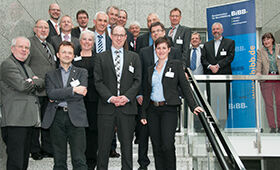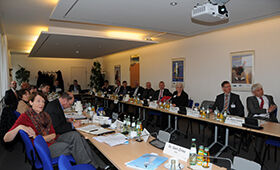Joint journey into a digital future
How can the organisation of company-based education and training be adapted to the requirements of an increasingly digitalised world of work? And will digitalization result in a need to modernise or restructure individual training occupations? With selected occupational families and training occupations within the Volkswagen Group in mind, these form the key questions in a project which the Volkswagen Group Academy is running together with the Federal Institute for Vocational Education and Training (BIBB). The project's interim results which were presented at a workshop in the BIBB in Bonn offer some strong indications, but at the same time are not conclusive in terms of how many job descriptions need to be changed and the extent to which this is necessary.

The presentations and discussions were attended by representatives from IG Metall, DGB (the Federation of German Trade Unions), DIHK (German Chambers of Industry and Commerce's organisation for promotion of professional development), ZVEI (the German electrical and electronic manufacturers' association), Audi AG, Gesamtmetall and KWB (Coordination Office for Continuing Education) in addition to representatives from the BIBB, the Department for Education, the Department for Economic Affairs and VW. The potential occupation of “Operational maintenance technician 4.0” took centre stage in the presentations and discussions as an example of a job profile for the future. In the view of the experts, the “Maintenance Technician” role is also typical of the developments anticipated in a number of training occupations because the skills of the future it requires are comprised of three components: Firstly, the Maintenance Technician will break new ground, for example in terms of the analysis, monitoring and expansion of production networks; secondly he or she will have to deal with an increased IT requirement in specific activities (e.g. checking interfaces and components); and thirdly, as previously, he or she must possess significant mechanical understanding (in order, for example, to fit or remove mechanical assemblies).

As the project participants explained, the consequences of such a change are diverse, adding that no existing profile from among the recognised training occupations corresponds completely with the emerging job description of the “Maintenance Technician”. IT qualifications have gained a higher status and exist in a technical, system and process-related context. Qualifications relating to system and process understanding as well as problem solving define the profile; the core competencies for this must be delivered through the vocational education and training and must be further developed by means of continuing education and training as well as at work.
According to the interim results of the project, three example scenarios are conceivable in terms of regulatory work: a regular restructuring procedure for which the “old” Mechatronics Technician profile would serve as the basis but would cease to exist in its own right; a regular restructuring which creates a Mechatronics Technician profile in different specialisms; and finally a slightly modified Mechatronics Technician profile which acquires a company-specific additional qualification.

A broad range of opinions was apparent in the discussion regarding these options. On the one hand there was the position suggested by the profile presented and the related potential for training policy innovation. This supports the creation of a new occupation for the role of operational maintenance technician - which is key in the context of Industry 4.0. On the other hand, the central emerging argument proposed was that the currently applicable and relevant occupations are formulated to be open-ended in terms of technology and design; and it would therefore be a matter for the training companies to utilize this scope. Those involved in the discussion agreed that it were precisely these differences in opinion which showed how important it was to take this discussion forward.
In light of the initial results of the collaboration, the President of the Federal
Institute for Vocational Education and Training, Prof. Dr. Friedrich Hubert Esser, emphasized the opportunities of digitalization for vocational education and training. “In addition to the technical findings, not only will the overall contribution of vocational education and training to training in the future become clear”, he commented. “We shall also see the extent to which the capabilities, particularly of young people in the use of digital products, are able to meet the requirements of company-based education and training, and might even be merged together in a meaningful manner to create something new.”